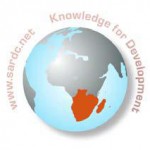The Southern African Research and Documentation Centre (SARDC) is an independent regional knowledge resource  centre established in 1985 to strengthen regional policy perspectives and track implementation on a range of issues in southern Africa, and works in partnership at national and regional levels. SARDC is made up of topical institutes that focus on relevant regional processes, and has a long track record of achievements, in partnership with the Southern African Development Community (SADC) and others.
centre established in 1985 to strengthen regional policy perspectives and track implementation on a range of issues in southern Africa, and works in partnership at national and regional levels. SARDC is made up of topical institutes that focus on relevant regional processes, and has a long track record of achievements, in partnership with the Southern African Development Community (SADC) and others.
SARDC
SOUTHERN AFRICAN RESEARCH AND DOCUMENTATION CENTRE
Vision
SARDC is an independent regional knowledge resource centre which seeks to enhance the effectiveness of key development processes in southern Africa through the collection, production and dissemination of information, and enabling the capacity to generate and use knowledge.
Mission
SARDC’s objective is to improve the base of knowledge about economic, political, cultural and social developments in southern Africa, and their implications, by making information accessible to governments and policy makers, non-governmental organizations, the private sector, regional and international organizations, development agencies, parliaments, and the media.
Institutes
SARDC is made up of topical institutes that focus on regional policies and processes such as regional economic integration and infrastructure development including energy, transport, trade, technology, and tourism; as well as environment, water resources and climate change; gender equality and women in decision-making; media and elections; and China Africa studies; as well as five specialist support services for Financial services; Facilities administration; ICT and Web development; Publishing; and the core Knowledge Resource Centre.
Partners
SARDC works in partnership with the Southern African Development Community (SADC) through a general Memorandum of Understanding (MOU), first signed in 1995, reviewed and broadened in 2005. SARDC also partners the Southern African Power Pool (SAPP), the UN Environment Programme (UNEP), Zambezi Watercourse Commission (ZAMCOM), the SADC Gender Unit and others, including networks of national partners in SADC member states, and several African Studies Institutes and think tanks in China. SARDC has been the lead agency for regional environmental reporting since the Rio Earth Summit in 1992, and has been monitoring gender equality targets in southern Africa since the Fourth World Women Conference in Beijing in 1995. A more recent edition is the regional monitoring of Energy in Southern Africa, since 2007.
Methodology
Reliable and accessible knowledge relevant to southern Africa is generated through a process of data collection and research, participation, networking, wide consultation and ownership, and targeted dissemination, reaching into national, regional and global policy processes.
Databases
The Knowledge Resource Centre contains subject files and electronic portals on regional issues, a library of books and periodicals, and computerized databases using ABCD software; and is reconstructing its Virtual Library for to update internet access to its resources.
Virtual Library
SARDC specializes in Research that informs Development, and has established innovative knowledge access through the Virtual Library for Southern Africa www.sardc.net Knowledge for Development.
Institutional Capacity
SARDC has almost 30 years of institutional experience in documenting, analysing and communicating trends in regional development, in publishing and distributing the results, and monitoring impact, as well as recognized financial accountability, a range of qualified staff from the SADC region and an extensive network of partner organizations and contacts, and has language capacity to publish in the official SADC languages of English, Portuguese, and French.
Governance
SARDC is managed by an internal Management Committee made up of the heads of institutes and services. The governance structure is headed by a 10-member regional Board comprising 4 women and 6 men, with expertise in various related fields, who determine the strategic focus and policy of the institution. The Board is chaired by Hon. Prof. Peter H. Katjavivi, MP, founding Vice Chancellor of the University of Namibia, and currently a Member of the Namibian Parliament and the Pan-African Parliament. The Founding Patron of SARDC was the late Mwalimu Julius Nyerere of the United Republic of Tanzania. SARDC is entirely project funded and earns about 20 percent of income from consultancies and services.